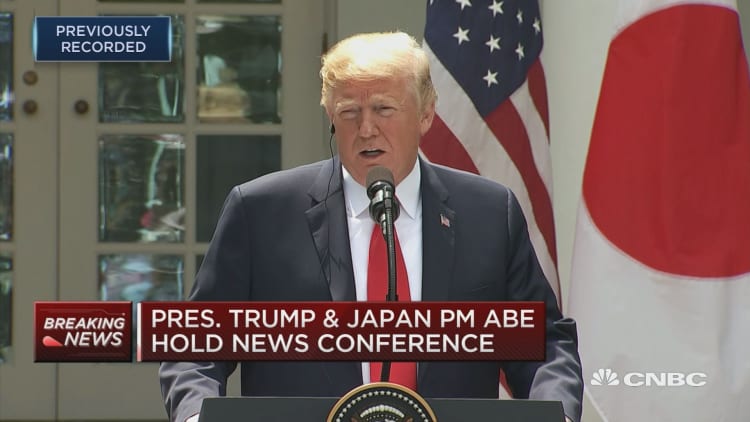
President Donald Trump said Thursday that he would "certainly" invite North Korean dictator Kim Jong Un to the United States if next week's nuclear summit in Singapore goes well.
A visit to the U.S. — which Trump added could take place at the White House — would be remarkable after decades of minimal contact between the U.S. and the communist dictatorship. The talks next week will mark the first time a sitting American president and North Korean leader meet face to face, as the U.S. aims to push Pyongyang to abandon its nuclear and missile programs and ease concerns about the prospect of armed conflict.
At a joint news conference with Japanese Prime Minister Shinzo Abe on Thursday, the president said he wants to eventually establish normal relations with North Korea if the regime commits to denuclearization. Abe also stressed that Japan — which has long had tensions with North Korea — is ready to normalize its links to Pyongyang, as well.
"Normalizing relations is something that I would expect to do, I would hope to do," Trump said.
While Trump said he sees the "potential to make a deal" with North Korea to get the isolated regime to abandon its nuclear ambitions, he stressed that he is "totally prepared to walk away" from the summit. Trump already canceled the meeting once before it was rescheduled, following a key North Korean official's trip to Washington.
The summit brings the opportunity for a potential breakthrough in talks to reduce tension in East Asia. However, the North Korean regime has long proven unreliable in international negotiations, sparking concerns about what concessions Trump and American allies such as Abe can get from Pyongyang.
Further stoking concerns in America is Trump's preparedness for the summit. Earlier, he raised those fears by saying, "I don't think I have to prepare very much" for the summit.
On Thursday, Trump said he stopped using the "maximum pressure" language previously employed to describe international economic sanctions against North Korea, "because we're going into a friendly negotiation." When Trump stopped using the term in recent days, it reportedly concerned Abe.
The Japanese prime minister said Thursday that Trump will not lift "very strong sanctions" on North Korea until it takes actions toward denuclearization. He added that he wants any deal between Trump and Kim to address all weapons of mass destruction and midrange ballistic missiles.
Trump stressed that he kept all existing economic sanctions on North Korea. The president has a long list of new sanctions prepared, should talks go awry, he said.
"Maximum pressure is absolutely in effect," he said.
Abe also said he stressed to Trump the need to bring up Japanese citizens being held hostage in North Korea during the summit next week. He said the president "fully understands" the issue's importance.
Later Thursday, Secretary of State Mike Pompeo said the "complete, verifiable and irreversible denuclearization of the Korean Peninsula is the only outcome we will find acceptable." Kim personally "indicated" to Pompeo that he is prepared to denuclearize, the top American diplomat said.
Pompeo said Trump is "hopeful" but is "going into the summit with his eyes wide open" about possible duplicity.


